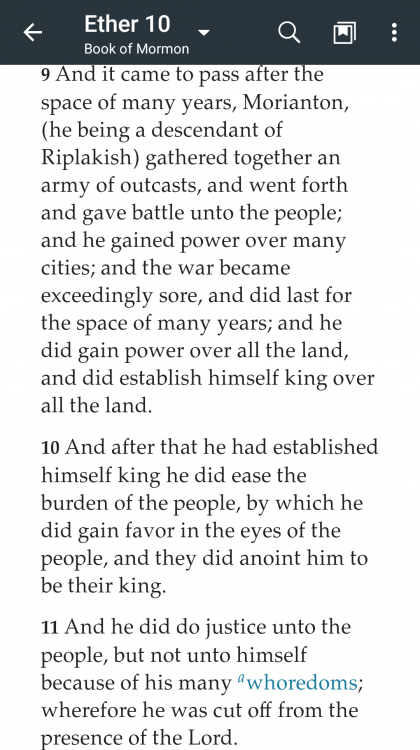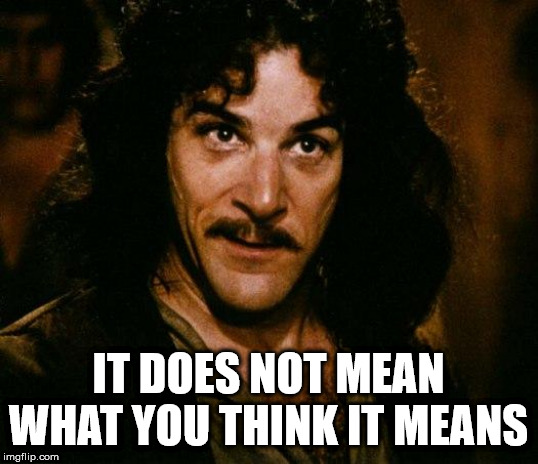-
Posts
2055 -
Joined
-
Last visited
-
Days Won
13
Everything posted by person0
-
Even if the idea of progression between kingdoms is ultimately true, what is the personal advantage of discovering and believing it during mortality? I can't think of any worthwhile mortal advantage; however, I can think of at least one major disadvantage, namely a lack of concern about procrastinating the day of ones repentance.
-

Revelation that separates spouses
person0 replied to Openmind's topic in Marriage and Relationship Advice
This is along the lines of what I would imagine is happening. -

Revelation that separates spouses
person0 replied to Openmind's topic in Marriage and Relationship Advice
Are there other problems/struggles in your marriage? Is there a specific reason he could be drawn to infatuation with another woman? -
I tend to think of healthy/unhealthy in terms of habits rather than specific food items. I really don't see anything particularly unhealthy about traditional potato chips; however, I would certainly agree that eating large quantities would be an unhealthy habit. Even for some of the more complex flavors, like Barbecue, if anything, the only specifically 'unhealthy' thing might be the caramel color; everything else are likely to be found within many so called 'healthy' meals.
-
I couldn't agree more.
-
-

No Guns in Sacrament Meeting—We Mean It This Time!!!
person0 replied to Just_A_Guy's topic in LDS Gospel Discussion
Oh, I have no doubts about that at all. -

No Guns in Sacrament Meeting—We Mean It This Time!!!
person0 replied to Just_A_Guy's topic in LDS Gospel Discussion
I have been obedient to this policy, but I'm nowhere near convinced that it is right, nor that it was the direct result of revelation. -
His father might have been God, but He was still raised by Joseph and Mary. Biologically, God is still a man. Other than that, I'm not sure what kinds of differences you might be referring to.
-
If we are to compare ourselves to Christ and seek to emulate Him, how could it be anything other than an apples to apples comparison?
-

Gross Tithing, Gross Blessings. Net Tithing, Net Blessings
person0 replied to Backroads's topic in LDS Gospel Discussion
I would suggest that if we weren't all too lazy to do it and if so many people weren't inordinately wasteful, the most accurate way to calculate tithing could be to determine one's total net worth as of January 1st of each year and to make a lump sum payment equal to 10% of the increase in net worth over the prior year. Something like that is how I presume Abraham paid his tithes. Given that most people don't live or account in such a way that would enable them to do that, I think people need to shut their traps and just teach that tithing is on 10% of our increase as the scriptures state and let people figure out what that means between them and the Lord. I have no problem with someone stating the specific way they pay tithing, but imposing their view upon others is inappropriate, especially as it pertains to tithing. If one lives the law of tithing, they live the law of tithing, and that is sufficient to merit any associated blessings. -
I think you just might be right, haha. Yup; confusing.
-
The Lord seems to think so. His ways are not our ways. Once again, you are applying a mortal understanding to an eternal being, not limited by our finite understanding. ??? Since when are you and I discussing God creating things ex-nihilo? I assumed that as a Latter-Day Saint you would already be in on the belief that He created ex-materia; is my assumption incorrect? I have clearly laid out in another thread that if God were to have created all things ex-nihilo that determinism would in fact be the only logical conclusion, and God would be 100% responsible for the actions of all His creations. See here: I am arguing that given creation ex-materia, we can yet identify God as an all-powerful being once one understands that abstract 'powers' that can be imagined in the mind but that do not actually exist cannot be included as part of the 'all' in all-powerful. The ability to create an immovable rock does not exist, hence it does not detract from designating God as omnipotent. Anyway, I feel I have adequately explained my logic; if there continues to be a disconnect, I am not sure what more I could explain.
-
If I am reading your words correctly it sounds as though you are suggesting that if God has the ability to cause an effect, He therefore is responsible of said effect? If so, that makes no sense whatsoever, because the ability to cause an effect or produce and outcome is not the same as actually doing it. Even if we go to your original example (a few posts back) and suggest that God is able to designate whom you will love, that is not the same as Him actually doing it. Okay, upon seeing this I am realizing that we have a fundamental disagreement that I don't think is resolvable. I think I remember this from a few years ago in the huge thread about agency. God's ability to do something does not require him to do something, nor does it make Him responsible if/when he chooses not to do something. You may suggest that not doing it, being a 'choice' in and of itself would make Him complicit in the outcome; I would disagree. Yup. Fundamental disagreement. Your transposition of such a rule onto God will, by its nature, implicate God for your mortal and imperfect definition of what it means to 'do good'. Could one not argue that the greatest good would be to allow for every man to be wholly aware that his eternal reward is perfectly commensurate to his own choices? On a similar note, let us assume for a moment that you are correct. If we say that God is not all-powerful because of the fact that He would then be all-responsible and apply that simple statement to all of our earthly history would implicate God in many ways, because of the powers we know He does possess. We know God is capable of speaking to men, He is capable of intervening in our actions (i.e. saul), and He is capable of performing miracles. Has there never been a time when someone has lost their faith, never to be regained, because of the 'inaction' of God according to their righteous request? Is God responsible for their fall? According to the implications of your assignment of responsibility, God is already responsible for everyone who falls away, and everyone who follows a wicked path, etc, etc, when He could have intervened to bring about a different result. From scripture, we already know enough about God's power and abilities to be able to assign Him the blame for our mistakes, if we use the definition you provide. I do not agree that power equals responsibility in the way you have asserted. Again, it appears we have a disagreement at a fundamental level that affects our ability to come to an area of agreement as to whether or not God is omnipotent. I will close with a quote by Spencer W. Kimball in one of my favorite talks, 'Tragedy or Destiny?'
-
I suppose we simply will have to disagree on this one. I don't think the powers of one being have any bearing on the powers of another being; they are not mutually exclusive. Based on what you are saying it would mean that powers can be created that did not previously exist. If I were the first creation and God granted me the power to choose, according to your logic, my ability to choose is a power that did not previously exist and, now that it is given, God is no longer 'all powerful'. The problem with this is that all powers, principles, elements, etc, have existed for all eternity without beginning and end. Hence it is not 'my ability to choose' but 'the ability to choose'. Looking at 'powers' in this way it could be said that God did not create for me the ability to choose, but instead enabled me to have and use this ability. As I mentioned before, I think a lot of this is paradigm related. When considering things from my paradigm, God is capable of acting in use of every power that exists; that is not to say that He would do so in all cases, but instead, simply that he is capable. My ability to choose and your ability to choose are not separate powers, instead, they are two people with access to the same power. What is a separate power would be your and/or my ability to influence what one another will choose. Even then, choice and influence is a total of two powers that two separate individuals possess, not four total powers. Anyway, that's how I see it.
-
For those of us on the forum who are used to programming languages, in an array of items, 0 is the index of the 1st item. person0 would be like saying 'the first person'.
-
Looking back on my youth in my late teens and early on my mission, I always felt slightly confused by the fact that I was absolutely confident that the Church of Jesus Christ of Latter-Day Saints is the True Church of Christ. My confusion came by the fact that I felt so confident about it that even during the time when I questioned the reality of God, Christ, and His Atonement, unusually, it never came to my mind to truly question the veracity of the Church. Because of a specific experience on my mission, I came to understand why this was the case at the same time that I was alerted more deeply to the realization this had actually been happening. Around the middle of my mission, I received a blessing from my Mission President in which he told me that one of my gifts of the Spirit is "to know that the Church of Jesus Christ of Latter-Day Saints is true". This experience was an eye opener as all of a sudden these experiences from my past made sense to me. Different people will have different experiences in the Church. However, while some may feel compelled to say "I know" when they actually do not, for many of us, we do know, and we ought to state as much. For me, I know the Church is true by the power of the Holy Ghost, and I am happy to state it!
-
Step 1) Come to an honest decision about what you actually want Step 2) Pray to ask Heavenly Father if He will confirm approval of your decision Step 3) If you receive a confirmation and can be at peace with your decision laid out in Steps 1 or 4, proceed to Step 5 Step 4) Come to an honest decision about what you think you should do Step 5) Proceed with steps necessary to act upon your decision
-
If one has as a foundational belief in creation ex-nihilo, then the Calvinistic belief in predestination/determinism is the only logical conclusion. This is not limited to Christian based faiths. If one believes that a single deity is the creator from nothing of all things in existence, then said creator can only be relinquished of responsibility of the actions of its creations if the deity is not omniscient. In Christianity, Judaism, and Islam, God is understood to be an omniscient being; this means that if He created (from nothing) our intelligence, personality, and individuality, being omniscient, He would be responsible for our actions. How? Because having all knowledge in advance of something over which He has complete control, makes him responsible for the outcome; He could have made us with a different personality, to where we would use our gift of agency to make the right choice 100% of the time. Likewise, our agency would not truly be real because, being the creator of all aspects of our sentience would indicate that not only did God create us knowing every action we would ever take, but also could have created us differently, which would have resulted in our 'choices' being different. The belief in the eternal identity of man, as is taught in the Restored Gospel, in conjunction with belief in creation ex-materia, is the only way one can logically establish the reality of the individual free agency of man. My perspective.
-
Fixed that for you 🙂
-
Thank you for chiming in (Serious). Your statement helps to establish my initial point which is that I will tell you all day long I am Monotheistic, but if you reject my claim to that title, I really don't give a crap as long as I am certain that what I believe is true. As long as I am comfortable with my monotheism, one's lack of acceptance is irrelevant. Just as the word 'trinity' is extra-biblical, but is a term coined to represent an ideology believed to be based on scripture, so too is the Restored understanding of the Godhead. The simple fact that we can reasonably use the same source material as evidence of opposing principles is evidence that earthly definitions are ultimately irrelevant. What is truth is truth, and what is false is false. In order to come to agreement on what form of religious 'ism' one is, we would have to agree on the source definition. It seems to me that there are sufficient detractors to the source definition, which ultimately leads the discussion to futility. The doctrine of the Church of Jesus Christ of Latter-Day Saints is that we are a monotheistic faith founded on our belief in the Father, Son and Holy Ghost as one God. Members of the Church should embrace this teaching and focus more on understanding the emulatable nature of the unity between the members of the Godhead that identifies them as one God and enables us to become one with Them and one another, as opposed to trying to find singular earthly terms that work to define the complexity that is the nature of God.
-
Okay, whatever. _______________________________________________________________________ Why can't we all just admit and acknowledge the fact that there is one God, that we worship the One True God, but that the intricacies of exaltation and our capacity to become a god, like God our Father is complicated? _______________________________________________________________________ Given the absence of a response to my lengthier post above, for now, I will assume a silent (perhaps grudging) acknowledgement of its accuracy and veracity.







